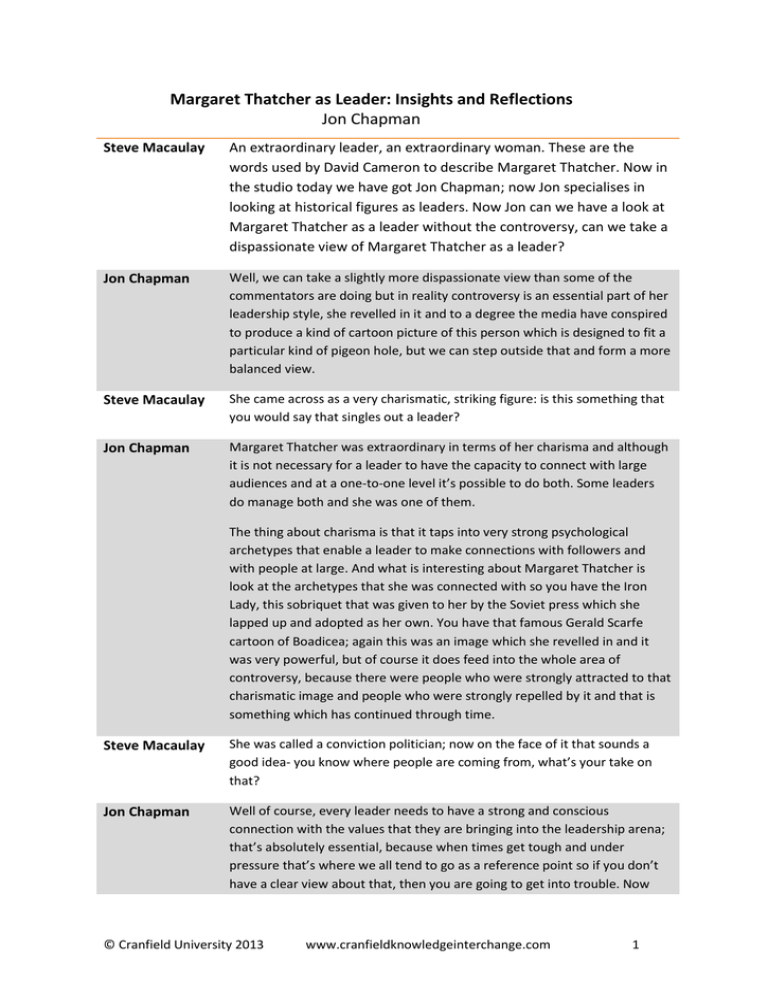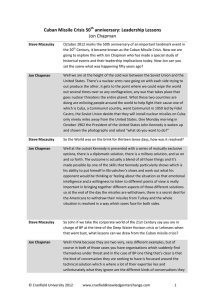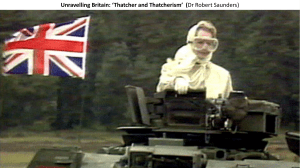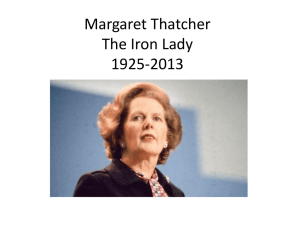Margaret Thatcher as Leader: Insights and Reflections Jon Chapman
advertisement

Margaret Thatcher as Leader: Insights and Reflections Jon Chapman Steve Macaulay An extraordinary leader, an extraordinary woman. These are the words used by David Cameron to describe Margaret Thatcher. Now in the studio today we have got Jon Chapman; now Jon specialises in looking at historical figures as leaders. Now Jon can we have a look at Margaret Thatcher as a leader without the controversy, can we take a dispassionate view of Margaret Thatcher as a leader? Jon Chapman Well, we can take a slightly more dispassionate view than some of the commentators are doing but in reality controversy is an essential part of her leadership style, she revelled in it and to a degree the media have conspired to produce a kind of cartoon picture of this person which is designed to fit a particular kind of pigeon hole, but we can step outside that and form a more balanced view. Steve Macaulay She came across as a very charismatic, striking figure: is this something that you would say that singles out a leader? Jon Chapman Margaret Thatcher was extraordinary in terms of her charisma and although it is not necessary for a leader to have the capacity to connect with large audiences and at a one-to-one level it’s possible to do both. Some leaders do manage both and she was one of them. The thing about charisma is that it taps into very strong psychological archetypes that enable a leader to make connections with followers and with people at large. And what is interesting about Margaret Thatcher is look at the archetypes that she was connected with so you have the Iron Lady, this sobriquet that was given to her by the Soviet press which she lapped up and adopted as her own. You have that famous Gerald Scarfe cartoon of Boadicea; again this was an image which she revelled in and it was very powerful, but of course it does feed into the whole area of controversy, because there were people who were strongly attracted to that charismatic image and people who were strongly repelled by it and that is something which has continued through time. Steve Macaulay She was called a conviction politician; now on the face of it that sounds a good idea- you know where people are coming from, what’s your take on that? Jon Chapman Well of course, every leader needs to have a strong and conscious connection with the values that they are bringing into the leadership arena; that’s absolutely essential, because when times get tough and under pressure that’s where we all tend to go as a reference point so if you don’t have a clear view about that, then you are going to get into trouble. Now © Cranfield University 2013 www.cranfieldknowledgeinterchange.com 1 How Competition Strengthens Start-Ups there is of course a down side to it and it’s a particular thing that happens, I think, with leaders right at the top is that they tend to lose contact with the sense of perspective about what’s going on. And of course with Margaret Thatcher, you find that over time she lost a lot of the advisers that she’d had around her whom she trusted who actually could give her a different perspective on what was going on. The tendency then is to surround yourself with people who think like you and it creates a mentality which means that those convictions tend to increase, because I must be right because everyone is telling me I’m right and the capacity to empathise with people outside of that inner circle decreases. And over time, because that can lead to disaster, in the case of Margaret Thatcher of course most famously around the issue of the Poll Tax, that’s exactly what happened. Steve Macaulay So if we look in a historical context, she has been described as the greatest post war leader that we’ve had, can you put a wider perspective on that? Jon Chapman Well I’m sure she would prefer to be compared against the great wartime leaders of the Conservative party like William Pitt the Younger in the Napoleonic Wars for example going right back to the early nineteenth century, or of course with Winston Churchill, the great war leader of the twentieth century. But in terms of leading the country in the time of conflict, of course the conflict that Margaret Thatcher is most associated with is the Falklands War which was a relatively minor conflict and nothing like the kind of global conflicts that those other two prime ministers had to face. It might actually be more productive to compare her with some of the prime ministers who had to deal with political issues in a time where there is a lot of social conflict. So one might go back to Robert Peel and the repeal of the corn laws in the 1830s and 40s or with the Duke of Wellington introducing the one man one vote in the 1830s. Now those were prime ministers who introduced structural changes which fundamentally altered the economy or the social political fabric of the country and I think that is probably where a more fruitful comparison lies. Steve Macaulay So if we take these different perspectives that you have outlined here, how would we sum up Margaret Thatcher? Jon Chapman When we look at the criteria that we would apply to any leader in terms of whether they qualify to be called a high performance leader we look for a leader with a strong vision and clear and identifiable values pursuing a worthy purpose. We look for someone who performs at an exceptional level in terms of the personal capacity in the job, we look at someone who manages to achieve that performance over an extended period of time and in a context where there is a huge amount of pressure. © Cranfield University 2013 www.cranfieldknowledgeinterchange.com 2 How Competition Strengthens Start-Ups Now those are the kind of criteria which we would use to define a high performance leader and when one looks at those criteria comparing them against Margaret Thatcher you would say that she pretty much ticks most of those boxes. But of course the fact that her reputation her legacy is still so mired in controversy, even right at the end of her life, tells us something about where we might look for the questions in this and that would be around the vision and values, because it’s the role of any leader to take followers with you and one of the things that of course we know about Margaret Thatcher is that she was essentially the product of a political system which is very partisan. So there are plenty of people who think she was wonderful and plenty of people who think she was terrible and it seems like those two opinions are never really going to be reconciled. Steve Macaulay Food for thought- thank you very much, Jon. Jon Chapman You’re welcome Steve. © Cranfield University 2013 www.cranfieldknowledgeinterchange.com 3


